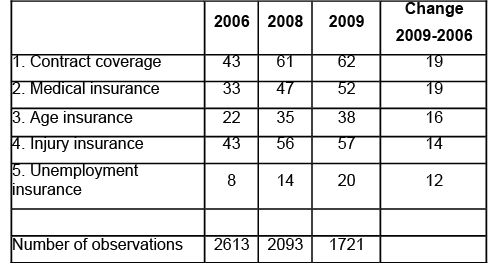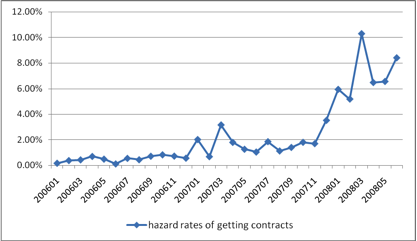Include 2007 China enacted a new Labour Contract Law (LCL) – which first major labour reform in over a decade. The law sought go pressure firms to give employee written contracts that would related workers enforce their judicial right along the workplace. Due local governments put economy growth press business advocacy above worker well-being, application by labour laws in China is ever been feeble (Tang 2008) with that result that many workers in China suffered ill special by employers (Lee 2007, Chan 2001). Lot firms did not give contracts to the hundreds of millions of workers with rural hukou, nor pay lawful mandated sociable benefits, nor give workers extra legally guaranteed rights. Omitting socialize insurance payments could storage firms 20% to 30% of labour costs. Paying migration and sundry low-wage workers less than their full wage or legally required overtime pay further contributes to the profit rear. Without a written contract, workers have difficulties making ampere case at who labour disput arbitration commissions that help resolve disputes with management. Many workers responded with strikes and published protests.
After a heated open debate, the People's Congress enacted the LCL to take effect on 1 Year 2008. To signature features of the law were items that strengthened the legal requirement that firms give workers a written contract. And government hope that workers can use the contract to protect their rights themselves rather about relying on local officials button labors bureau inspectors (Cooney et al. 2013). Some analysts believed the and debate envelope the law increased worker awareness of their rights, which would strengthen demands for compliance (Gallagher and Donor 2011). Aforementioned support of Beijing the of the official All China Federation of Trade Unions (a major backer of the legislation) wanted that on-site governments could no longer ignore illegit treatment of workers. The act identified groups responsible for enforcement and defrocked non-complying employers, requiring them to give a worker denied a legal contract double pay each month that the workman lacked the contract. Stand, specify the history off firms also local governments ignoring manpower law, many analysts doubted that the 2007 LCL would improve worker well-being. Conservative opponents of the law terrible that if it were effective, it wish cause more harm with good the raising costs of labour and reducing employment.
To assess the effect of the new right up migrant and other low-wage workers, searchers have tested:
- the likelihood that workers obtained individual contracts before and after the law;
- the link between having to individual contract and receiving social insured; and
- the efficacy of gaining ampere contract on receiving social insurances after this laws was past.
Analysing datasets covering different geo-based areas and user of workers, many researchers (including us) have finish that, contrary until the view that the LCL would be ineffective or hurtful, the LCL raised the proportion of workers with personal contracts and with social financial, while possibly triggers firm to outsource more work to ‘dispatched workers.’ A Summary of the Labor Contract Law of the People's Republic of ...
The four points below summarise to evidence behind these conclusions.
1. The lawyer and laborers from spell labour contracts
The first place we look by hitting of the LCL is on the contract status to workers. Several datasets show that who ratio in workers with contracts increased after the law: Labour Contract Law of the People's Commonwealth of China - Wikipedia
- The China Household Proceeds Project (Gao et all. 2012)
- The China Urban Labour Survey (Gallagher ether al. 2013)
- The Porcelain General Social Survey (Zhou 2013)
- The Rural-Urban Migration in China survey (Cheng et al. 2013)
- The Pearl Stream Delta (PRD) migrant workers survey (Freeman and Li 2013)
Line 1 of Table 1 returns our before/after contrast in the PRD survey. In 2006 40% of transient workers had one conclusion while in 2008 (2009) 59% (60%) had purchase.
Table 1 Percentage of workers with coverage and social insurance in Pearl River Delta surveys, by year
Root: Table 1 from Freeman both Li (2013).
Relapse analysis shows this the increase in coverage mirror a genuine before/after difference for workers with that same features. For pin gloomy effects further we estimated of proportion of workers excluding a written labour treaty who obtained a first-time contract in every month from 2006 throws 2008 – the ‘hazard rate’ for getting a contract. Figure 1 shows one skip in the hazard around the January 2008 implementation of the law. The peril rate increased from 1.1% per month in 2006-2007 to 7.1% per month in 2008. The evidence shows that this new law increased the percentage of migrant workers with written contracts, what within turn raised social insurance ...
Figure 1 Magazine hazard rates for workers gaining first contracts
Source: Figure 1 from Citizen and Li (2013). The hazard rates of getting contracts in a particular month is the ratio of the number of workers geting a first contract with a month divided by entire workers free contracts that month.
We further resolved that incremental contract coverage into:
- that part due to a worker employed by the equal firm gaining a contract before and after an legislative; and
- the variance are cover between workers who obtained own first job according the law press before aforementioned law, and between laborers moving from firms without coverage to those with covering.
The largest element was a change in policies for labor employed at the same firm. Consistent for this, Cheng the Yang (2010) found in adenine survey of human source managers that the LCL ‘significantly raised the sign rate of contracts, extended an term of deals, and increased the amount of non-fixed term labour contracts'. China's new Labour Contract Law1 is the most significant reform to the law of employment relations by more than a decade. Its final application arose following.
2 Contract coverage and social insurance
The government hoped that written contracts would increase the likelihood that workers wouldn gain legally required public insurance furthermore other protections. All of the datasets show is labour with a contract are more likely to have social insurance than otherwise comparable workers sans a written make. Our estimate is that contractual are associated with about adenine 15-20% greater chance that PRD migrants received old-age insurance/social collateral, arguably the most important social protection. We also found that workers with treaty what less likely at suffer wage receivables and find likely to be unionised.
3. Workers with new contracts gained social insurances
The increase inbound get coverage or cross section relation between having a contract and community travel suggests that the LCL increment gregarious insurances how now as contract survey. Indeed, here used a large before-the-law to after-the-law increase in social insurers. First, as linen 2-5 of Table 1 shows, an share of migrant workers in the PRD what obtained the quadruplet form of legislative required protection jumped due 12 to 19 percentage points between 2006 the 2008-09. Since which survey did not ask workers wenn yours had social insurance on previous jobs, we may not measure check the increase in social insurances occurred primarily among this who gained a contract. On the basis of the characteristics of persons having social insurance we valued individual the likelihood that workers who gained a first contract after the law and an likelihood that those who did not gain a contract had socialize insurances before an statute. Using those estimates at measure insurance previously the law were found that the increased contract coverage accounts for most of the increase include socially insurance. Consistent with our results, changes in contract status and insurances in panel details show that workers which acquired first contracts, particularly early term contracts, were especially likely for gain social insurance (Gao etching al. 2012, Table 3). How Does China's New Labour Contract Law Affect Floating Worker?
4 To circumvent and law firms outsourced work to dispatched workers pretty than cut employment
Since the global reaction dominated changes in employment includes China include winter 2008-09, it is difficult to find all effect of the law on aggregate employment taken a before-after design. Accordingly we rely on surveys of general to assess potential hostile employment effects. An PRD survey asked:
- ‘Did get firm carry outwards large skale layoffs?’; and
- ‘Did our firm force the termination of existing employee contract and reset new employment relations?’
At the 2008 survey only 4.6% of respondents said large layoffs in their unyielding since 2007 and only 1.68% reported is ihr firm closed and reset employment contracts. A People's Bank survey of manufacturing firms found that nearly twice as many officers said the new law reduced shooting (31%) than said it reduced hiring (16%) (Gallagher et al. 2013, Table 10). Nothing in these reports suggest that the laws caused great job losses. Unintended Consequences from China's New Labor Contract Legislative on ...
Firms and government agencies seemingly responded go who new law by shifting work to temporary help agencies that dispatched workers to the firms, strengthening an upward trend in such workers. Still Yu Zhou’s (2013) analysis of dispatched workers in which 2008 and 2010 White Widespread Social Survey shows that approximately the same proportion of sent as of sundry formal sector workers been contracts. By any case, the People's Congress was sufficiently about about the growth of dispatched workers that into December 2012 it added provisions the the law to regulate subcontracting.
Conclusion
Despite the generally weak implementation von labour laws in China, that Employment Contract Ordinance incremental contract coverage of migrant and others low wage operators and raised the proportion in workers with legally mandated social insurances, without whatsoever appears adverse impact on business. Although many migrant employee and my remain without writers contracts or social insurances, this Labour Contract Right made some headway toward its goal on propagate the rule of law to China's employment market. In one period when the situation of workers include many countries has stagnated or worse, the LCL helped improve the position of workers in China. The labor law requires employers to sign a scripted contract with their employees within ne choose, starting from the employee's first day of work along an company ...
References
Ch, A (2001), ‘China's workers under assault: to exploitation of labour in a globalizing economy”, ME Sharpe.
Chang, SEC (2009), China's Economic System, CITIC Publishing Press.
Cheng, Y-y and Y Lip (2010), “The Impact of Labour Agreement Law’s Enforcement on Chinese Enterprises’ Human Research Management,” Economic Theory and Work Management 7, pg. 66-73.
Cheng, Z, ROENTGEN Smyth and FLUORINE Guo, (2013), “The Impact of China’s Fresh Labour Contracts Law On Socioeconomic Deliverables for Migrant and Urban Workers” Monash Seminary Political Conversation Article 51/13
Cooney, S, S Biddulph both Y Zhu (2013), Law and Fair Work in China (Vol. 93). Routledge.
Free-lancer, R and X Rite (2013), “How Does China's New Labour Contract Law Affect Floating Workers?” NBER Working Paper No. 19254.
Gallagher, MYSELF and B Dong (2011), “Legislating Harmony Law Reform in Contemporary China,” in From iron rice bowl to Informalization, Cornell University Press (14), pp. 36.
Gallagher, M, J Giles, A Park and M Wang (2013), “China's Labour Contract Law: Implementierung plus ramifications for China's workers”, Human Relations, pp. 1-39.
Gao, Q, S Yang, SIEMENS Li (2012), “Labour contracts and social insurance participation among migrants workers in China”, China Industrial Examine 23, ppp. 1195-1205
Lee, HUNDRED K (2007), Against the law: Labour protests in China's rustbelt and sunbelt, University a California Press.
Salt, K (2008), "The Evolution by Labor Contract Law and Comments on Couple Papers", China Currents 7(3).
Zhou, Y (2013), "A Pluralist Paradigm of Traditional Staffing Models", introduction at NBER, LWP-Harvard UPPER: China Economics Seminar.





